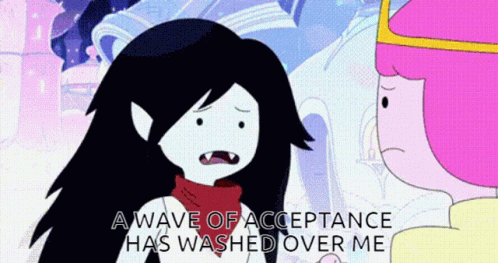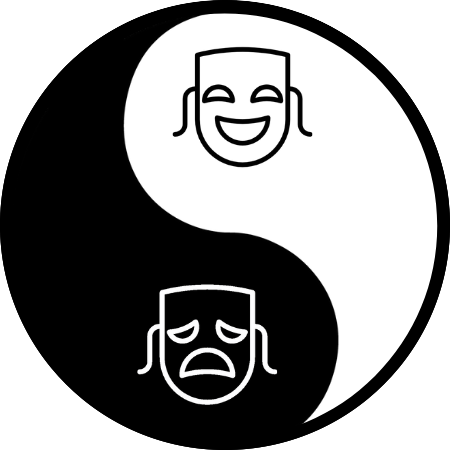Label It to Lessen It
Western actor training holds a funny paradox: we're expertly trained to navigate our characters' thoughts and feelings, and not at all trained to navigate our own.
We hadn't considered the true magnitude of this nuance until we worked with a cohort of third-year actors at a drama school in early 2024. Our sessions with these wonderful humans were replete with concerns about their ability to manoeuvre through challenging thoughts and feelings. And these were third-years, less than nine months out from graduating and entering the industry.
Our work and research since have revealed this cohort wasn't alone. Far from it. Rare is the actor trained to navigate their own internal states with the same deftness they navigate their characters'.
OG Dojo friends will know that acceptance has been part of the Dojo DNA from the drop. More recently, however, we've doubled down on its presence in the Dojo double helix.
Introducing acceptance
Acceptance Commitment Therapy (ACT – nice acronym, no?) is arguably the most popular instance of acceptance in clinical psychology practice. In the non-clinical domain, the ACT-inspired Mindfulness-Acceptance-Commitment (MAC) protocol has found traction with athletes and other peak performer populations (fun fact: we piloted the first study of MAC with actors).[1]
Acceptance-based therapies acknowledge that, on occasion, humans experience challenging thoughts and emotions. Such is the Homo sapiens sapiens existence 🤷 The "yes, and..." here is that these therapies posit we're far better off accepting our challenging internal states than playing whatever mental Twister we habitually play.[2] [3]
On the surface, this acceptance thang can strike us as a hugely disempowering practice. Why would we acknowledge the presence of shame-slathered thoughts or feelings of anxiety when we could ignore them or contort them into something "positive"?
This may sound like a smart solution, and, indeed, this is what our mental Twister typically comprises. Unfortunately, however, our brains don't seem to work that way. Due to the "ironic process of mental control", attempts to mind-pretzel our thoughts and feelings not only fall short but often backfire, compounding the number of unwieldy internal states.[4]
Further, acceptance is less of a finish line and more of a launch pad. It's the position from which we can succeed – yes, succeed – in our given endeavour regardless of the challenging thoughts or feelings that have arisen.[5]
As a result, this acceptance thang can be a hugely empowering practice. And y'all know how the Dojo feels about actor empowerment.
Acceptance in action
While we'll look at acceptance as applied to actor life here, keep in mind that the following can be adapted to life life, too. Remember, we're people first, performers second.
Let's say we're receiving redirection in a rehearsal, and the thought "I'm not good enough" pops up. Or we're walking from our trailer to set when we're suddenly filled with anxiety. In both instances, a challenging internal state has arisen. The acceptance dance might look a little something like this:
- Notice that a challenging thought / feeling has arisen.
- Side-step the impulse to ignore or control the thought / feeling.
- Side-step the impulse to judge or criticise yourself for encountering the thought / feeling.
- "Defuse" from the thought / feeling.[6] For example, instead of concluding "I'm not good enough" or "I'm anxious", put some distance between you and the internal state with languaging such as, "I'm thinking that I'm not good enough" or, "I notice I'm feeling I'm not good enough".
- If needed, exaggerate this labelling. Pull out your best David Attenborough and notice, "Oh my! Would you look at that! It seems we have found anxiety in its natural habitat!" Do what you need to do to observe (not ignore or control) without judgment or criticism.
- Return your attention to the task or performance at hand. Yes, the thought / feeling may still come along for the ride, but by labelling it, you have lessened it. The challenging internal state has been relegated to the back seat. You have the hands on the steering wheel (and Spotify playlist).
A key, key, key fact almost all actors could do with making their mantra is "high performing individuals perform well and have difficult internal experiences".[7]

Acceptance isn't resignation. Acceptance is being empowered to succeed in our endeavours, even when we inevitably encounter a challenging thought or feeling. It's about training our ability to thrive, not just be talented.
Thoughts / feedback / challenges? We'd genuinely love to hear.
Need some 1-On-1 attention? Book your coaching session today.
Citations:
[1] [5] [6] [7] https://amzn.to/3Cl3VUp
[2] https://doi.org/10.1123/jcsp.3.4.320
